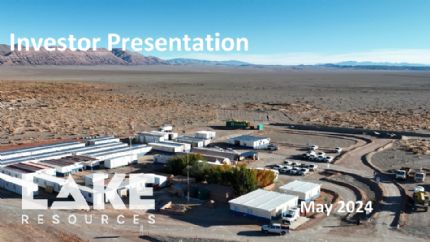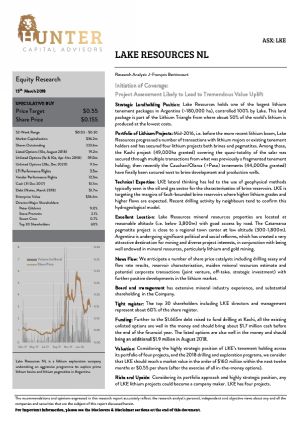
Successful Extraction and Injection Tests at Kachi
Sydney, Aug 15, 2023 AEST (ABN Newswire) - Clean lithium developer Lake Resources NL ( ASX:LKE) (
ASX:LKE) ( LK1:FRA) (
LK1:FRA) ( LLKKF:OTCMKTS) announces successful testing that has proved the concept of extraction and injection to support the production of high purity battery grade lithium carbonate at the Kachi lithium brine Project ("Kachi" or the "Project") in Catamarca Province, Argentina.
LLKKF:OTCMKTS) announces successful testing that has proved the concept of extraction and injection to support the production of high purity battery grade lithium carbonate at the Kachi lithium brine Project ("Kachi" or the "Project") in Catamarca Province, Argentina.
"The extraction and injection testing confirms highly favourable reservoir hydraulic properties and allows us to optimise the future wellfield," Lake CEO David Dickson said.
"The tests represent a significant milestone for the Project, as they provide important data and higher confidence for our modelling, which is essential for the completion of our DFS for Phase 1.
The results are indicative of high-yield, production-scale, extraction wells in the core resource area." "Partners, offtakers and future buyers will demand sustainable lithium supply and Kachi is essential to meet this need."
Lake last updated its resource with a 53 percent increase in resources at Kachi with Measured, Indicated and Inferred increasing from 5.29 Million Tons (Mt) to more than 8.1 Mt Lithium Carbonate Equivalent (LCE). The mineral resources last reported on June 15, 2023 have not materially changed since that date.
Michael Gabora, Director of Geology and Hydrogeology for Lake Resources, said "the injection tests demonstrated the suitability of the reservoir for injection and bulk brine samples indicated that exploration sampling results were conservative."
"The positive results of this testing now allow for design of scaled up production and injection wells for the next stage of testing and production wellfield design".
The Kachi Project has shown continual increases in mineral resource estimates since the maiden estimate of 4.4 Mt of contained LCE in Inferred and Indicated categories was announced in November 20182 . The resource was significantly upgraded in January 2023 with a Measured and Indicated resource of 2.2 Mt and 3.1 Mt of Inferred mineral resources. The total resource was again increased in June of 2023 with more than 2.9 Mt LCE in Measured and Indicated and 5.3 Mt in the Inferred category for a total resource estimate of more than 8.1 Mt . The testing detailed in this announcement provides positive results related to the recoverability of these extensive lithium brine resources.
Completion of high-volume tests
The primary objectives of the extraction and injection tests were three-fold:
1) quantify hydraulic properties of the reservoir controlling well production / injection rates;
2) test the viability of injecting into the core resource area reservoir; and,
3) develop a robust dataset to support hydrogeologic modelling that will be used for wellfield design and reserve estimation.
Pumping and re-injection tests have successfully been completed in two test wells, KB and KC, located in the central portion of the resource area (Figure 1*). These pumping tests provide key data for hydrogeological models which are used to model the extraction and injection wellfields for the commercial operation.
The KB and KC pumping tests resulted in high transmissivity (the hydraulic conductivity x reservoir thickness) estimates of 145 m2/d and 156 m2/d, respectively.
These transmissivities extrapolate to high projected flow rates in larger diameter production scale wells, with longer intervals of screens, through which brine can be extracted, or in different locations where spent brine can be injected outside the production area.
Brine extracted from KC was injected into KB. The pumping extraction and reinjection order was then reversed, as this minimised requirements for tanks and brine storage at surface when pumping from the extraction to injection wells (Figure 1*). Minimal interaction was interpreted in the subsurface at the wells from the pumping and reinjection (i.e., minimal well interference) during the test periods.
Testing resulted in more than 14-million litres injected at KC and over 19 million litres injected at KB for a total of over 33 million litres of water successfully injected during the testing period.
The successful injection demonstrates the viability of injection in the core resource area and confidence that injection is also possible in geologically more favourable areas outside of the salar core.
The tests represent the first successful salar injection test in Catamarca known to the Company.
The data collected during these tests are being used in the development of the hydrogeologic model that will be applied to simulate and optimise the extraction and injection wellfields.
Of the twenty-five samples collected from the two test wells, the average lithium concentration was 263 milligrams per litre (mg/L).
Extraction testing indicates the reservoir is highly productive.
Injecting into the core resource area provided a mechanism to evaluate brine disposal, utilising the same wells from which brine pumping tests were conducted. This provided a cost-effective way of defining hydraulic parameters related to both pumping extraction and injection and also allowed Lake to prove out the concepts around injection and provided additional data for ongoing technical design.
Subsequent injection testing will be undertaken in the primary areas targeted for injection, south of the core resource area.
*To view tables and figures, please visit:
https://abnnewswire.net/lnk/OZS702JQ
About Lake Resources NL
 Lake Resources NL (ASX:LKE) (OTCMKTS:LLKKF) is a clean lithium developer utilising state-of-the-art ion exchange extraction technology for production of sustainable, high purity lithium from its flagship Kachi Project in Catamarca Province within the Lithium Triangle in Argentina among three other projects covering 220,000 ha.
Lake Resources NL (ASX:LKE) (OTCMKTS:LLKKF) is a clean lithium developer utilising state-of-the-art ion exchange extraction technology for production of sustainable, high purity lithium from its flagship Kachi Project in Catamarca Province within the Lithium Triangle in Argentina among three other projects covering 220,000 ha.
This ion exchange extraction technology delivers a solution for two rising demands - high purity battery materials to avoid performance issues, and more sustainable, responsibly sourced materials with low carbon footprint and significant ESG benefits.
| ||
|









